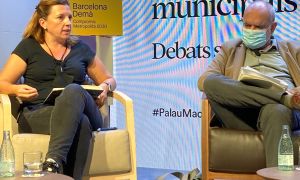Inequalities are no longer just observed within the cities themselves, but the 164 municipalities that make up the Barcelona Metropolitan Region have substantial income differences. The problem goes beyond the local level and requires a supra-municipal rethink. The conference "Social inequalities, municipal resources and metropolitan funding", organized by the Fundació Catalunya Europa, the Pla Estratègic Metropolità de Barcelona, ??PEMB, and Club of Rome, addressed this issue with two tables with the participation of technical, academic staff and mayors of the metropolitan region.
The Covid-19 crisis led to a legislative change that allowed the use of surpluses and surpluses by municipalities. "This fact has created even more differences throughout the territory because the starting point is not the same," said Olga Arnau, mayor of Vilanova i la Geltrú. Mireia Ingla, mayor of Sant Cugat del Vallès, also highlighted the differences between councils, which implies different answers. In Sant Cugat, for example, structural unemployment is not a problem, but on the other hand, there are serious difficulties in accessing housing, the mayoress explained. On the other hand, Antoni Balmón, mayor of Cornellà de Llobregat and executive vice-president of the AMB, focused on the ability of town councils to make redistributive policies that affect the conditions of public space. Beyond that, however, "municipalities can only pursue combat policies," Balmón complained.
Mayors found that the councils assume more powers than they deserve. "Sometimes our answers can only be palliative, because we need to contain the social emergency," said Lluïsa Moret, mayor of Sant Boi de Llobregat.
Faced with a situation of increasing inequality, local representatives agreed with the need for greater involvement on the part of other public institutions, especially the Generalitat and the State, and an increase in the presence of local bodies in decision spaces. "There needs to be joint frameworks and frameworks for action at the state level," Moret said. On the other hand, Xavier Fonollosa, Mayor of Martorell, called for an effort on the part of the institutions in order to create policies that favor the creation of wealth, economic activity and well-being. Fonollosa and Arnau also highlighted a recent phenomenon, and that is that gentrification has generated population growth in the cities of the second crown. Arnau denounced that this phenomenon has caused "an under-allocation of resources that does not respond to the current population."
To the question of the moderator, Maite Vilalta, professor of public economy at the University of Barcelona, ??on whether the councils would be willing to lose tax autonomy in favor of a more coordinated and collaborative vision, Antoni Balmón, bet on the creation of a metropolitan cadastre, while Arnau i Fonollosa advocated the adoption of coordinated and collaborative spaces and the improvement of supramunicipal governance.
In the same vein, Toni Merino, manager of Mataró City Council, defended that "the Covid-19 crisis has shown that the current administration model is not effective". Therefore, he proposed the creation of common tools, taking advantage of the instruments already available to municipalities, to communicate and exchange data between municipalities.
From the AMB, Guillem Espriu, coordinator of social policies of the supramunicipal body, explained that the AMB has seen a rotation of people but that this phenomenon has not changed the map of inequalities in the Metropolitan Region. "This means that we lack the capacity to correct inequalities," Espriu acknowledged.
Laia Ortiz, Director of Social Action at El Prat de Llobregat City Council, also claimed the need for metropolitan governance. She exemplified this with the issue of housing, since, according to her: “The remoteness means that the Generalitat cannot react to the vulnerability of certain territories, and the councils do not usually have the management capacity to meet the needs of the its municipality ”.
This need for reform was also defended by Sergio Porcel, a researcher at the Institute of Regional and Metropolitan Studies of Barcelona (IERMB). Porcel explained that the welfare state has serious difficulties in dealing with emerging risks, such as income security, job market precariousness or care, which do not have an easy solution for the public administration. In addition, the most vulnerable municipalities and neighborhoods stopped receiving specific funding with the suspension of the Generalitat’s Neighborhood Act of 2010.
For Lluís Torrens, director of Planning and Social Innovation of the Social Rights Area of ??Barcelona City Council, there are two major groups affected by inequalities, on the one hand, the people who are part of the persistent stock market of long-term unemployment over the age of 45, which will end in very low contributory pensions and therefore suffer the consequences of poverty for a lifetime. And, on the other hand, the younger population, which has undergone a process of impoverishment. This impoverishment is especially materialized in the lack of access to housing, as they can neither buy it nor save to do so later. "Their salaries have fallen by 28% in real terms in the last 10 years," said Torrens.
To finish
Some of the conclusions drawn from the municipal days:
- More coordination among municipalities: Mayors, as well as academic and technical staff, demand more coordination, not only between the municipalities that are part of the metropolitan area, but also the municipalities that make up the metropolitan region.
- Different solutions for different realities: Most of the great challenges facing municipalities today go beyond the metropolitan area and, therefore, a supra-municipal approach is needed. All this, without losing sight of the fact that the municipalities have substantial differences with each other and, therefore, their needs are also different.
- More decision-making capacity for municipalities: The pandemic has found that municipalities are the front-line administration in emergency situations. They are the ones who know the reality of their territory best and, therefore, can have a faster reaction capacity. Mayors and municipal representatives demand more decision-making capacity on issues such as housing, education or health.













